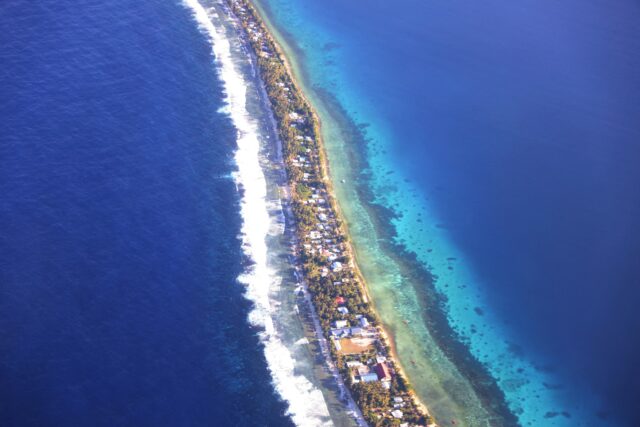In about 25 years from now, the Pacific island nation of Tuvalu may completely disappear due to rising sea levels and climate change, says a report in Wired magazine. The report quotes from a study by NASA’s Sea Level Change Team, that in 2023 Tuvalu’s nine coral islands and atolls lay just two metres above sea level, “making them extremely vulnerable to rising ocean, flooding and storm surges all exacerbated by the climate crisis.”
In fact, Tuvalu could be the first country to see its entire population of about 11,000 move to greener pastures, notably Australia which has pioneered a “climate visa” programme to victims of such tragedies.
The Tuvalu government had announced plans three years back to become the world’s first digital nation, even rewriting the constitution to define itself as a virtual state. Government functions are being digitised and Tuvalu’s history and culture will be preserved online even when the country no longer exists physically.
Tuvalu, however, is not the only island vulnerable to this. Maldives, the lowest lying country in the world, also faces this threat, with its 1200 islands just 1.5 meters above sea level. According to data from earth.org, 77% of its land area is predicted to be underwater by 2100, with a 2021 report by NASA concluding low-lying islands could become uninhabitable by 2050.
The escalating impacts of rising sea levels also seem to be reshaping India’s coastline, impacting socio-economic conditions especially in southern India. A report last year by the Tamil Nadu government titled Climate Risk Assessment and Adaptation plan, warned that by 2050, 6,000 hectares of land across the three eastern districts of Tiruvarur, Nagapattinam, and Thanjavur could go under water.
Worse still, coastal communities which have been historically dependent on fishing and agriculture, are now being displaced and forced to migrate due to these rising sea levels, and saltwater intrusion.
An Advisory Opinion delivered by the International Court of Justice on 23rd July, titled “Obligations of State in Respect of Climate Change” , underscored that under Laws of the Seas, states are obliged to work together in the context of sea level rise. This is important for rights of states and communities affected by climate change. But the court has no power over sovereign governments.
Rise in sea levels is driven by carbon emissions, and industrialised nations bear a large share of the blame for the manner in which they have degraded the environment in the pursuit of economic growth and wealt accumulation. This issue requires major policy changes and contributions especially by emitters like the U.S., to international climate commitments. But under President Trump, “drill baby drill” is the catchword and US oil and gas exploration is expected to see a significant boost.
(This article was written by Tisya Sharma, an Intern at StratNewsGlobal)





